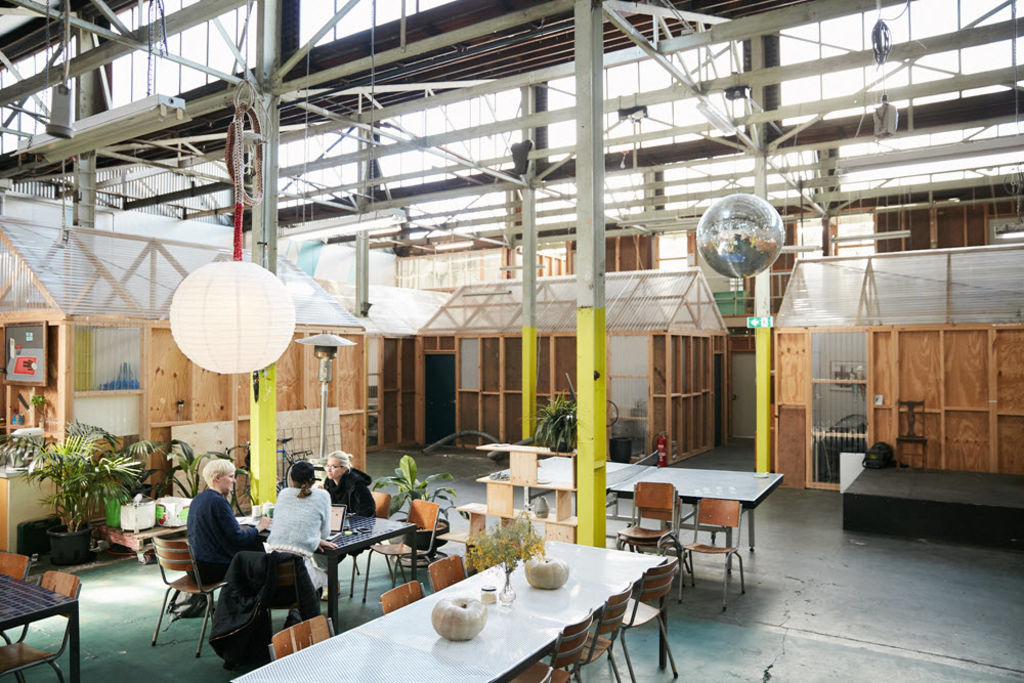
Charities that pop up on developers' land can be good for business
Community gardens, pop-up shops, and art studios temporarily appearing on land, and in buildings, slated for development are an increasingly common feature of our modern Australian cities.
Known as ‘meanwhile use’, the practice is being adopted by landowners and developers who are coming to see the many positives from leasing or allowing free use of these pre-development sites.
The Molonglo Group lease their commercial property in Collingwood to a not-for-profit arts organisation Schoolhouse Studios.
By chance Molonglo director Nectar Efkarpidis met the founders of Schoolhouse at their original premises one Saturday afternoon. “He was just stickybeaking with no agenda,” said Dan Honey, cultural director of Molonglo Group, but through “curiosity and conversation” discovered that they were in need of a new home and – luck would have it – Molonglo had just purchased two warehouses nearby.
Honey believes that arts organisations can positively influence the future of developments. “Schoolhouse Studios run rich social and cultural programs. The life they have brought to the neighbourhood has encouraged us to think differently about the potential for its [the warehouses’] future use.
“What began as an experiment or a prototype of sorts, is now influencing our future strategy in exciting ways.”
Empty Spaces is a Sydney-based not-for-profit that promotes ‘meanwhile use’ of empty sites. They believe that financially it can reap benefits for developers as “creative activity and cultural vitality in an area can push up property prices.”
The organisation also believes that ‘meanwhile use’ can reduce vandalism and squatting, decrease or eliminate maintenance, rates and insurance costs, avoid devaluation of property and “revitalise a local area”.
3000 Acres, a not-for-profit that connects landowners with food growers, has just established the Inner West Vegie Patch, the newest of their 16 food-growing spaces, on a pre-development site in the Melbourne suburb of Footscray.
“[Developer] Evolve see this as a positive way to begin their involvement in the neighbourhood,” said Pippa French, from 3000 Acres.
Evolve does not charge them for the space, and also paid to set up the gardens, one-third of which are used by the Asylum Seeker Resource Centre to grow fresh herbs for their food bank.
“I think many people are coming round to the idea of ‘meanwhile uses’,” said French. “Which is reflected in a council policy to reduce rates on vacant land if it is loaned for charitable purposes.”
Maribyrnong Council, where the site is located, told Commercial Real Estate that any property that met their strict guidelines for charitable use is, indeed, eligible to apply for rate-free status.
Nick Rose, executive director of Sustain: The Australian Food Network, approves.
“We encourage councils, if they don’t already, to provide incentives to developers to make parcels of land available for ‘meanwhile uses’,” he said.
“The challenges of this century are going to be about how cities feed themselves, and using available space creatively is going to be an important part of the solution.”
Rose believes that developers who practise ‘meanwhile use’ indicate that they “are fully engaged as corporate citizens”.
Neometro, the B-Corp-certified, Melbourne-based “socially led development group” could definitely be labelled engaged corporate citizens.
Neometro provided space for the first 3000 Acres food growing site in 2014, in Fitzroy, and have continued to partner with various arts and charitable organisations to utilise their sites.
Neometro director, James Tutton, said: “We look to find angles whereby we can bring – through our sites, infrastructure and relationships – positive social outcomes from a community perspective.”
He said that it was predominately a “buyer-led movement” that was driving the uptake of social-led practises such as ‘meanwhile use’ and encouraged other developers to follow suit. “We would like to change the industry,” he said.
Get a weekly roundup of the latest news from Commercial Real Estate, delivered straight to your inbox!








